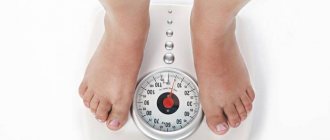Briefly about menopause, stages and signs.
Hormones are responsible not only for health, but also appearance and beauty.
Women feel this especially strongly during menopause, when their weight increases sharply and the amount of fat in the body increases. Is it possible to somehow improve metabolism and restore former slimness? Yes, if you understand the mechanisms of menopause. Menopause (menopause) is a natural process in the endocrine system associated with the decline of reproductive function. Gradually, the synthesis of the female sex hormone estrogen decreases. The process is accompanied by changes in metabolism, which affect appearance, health and mood.
Menopause is not an instant process. It takes years and lasts on average up to 5 years. Menopause consists of stages:
- premenopause. A gradual decrease in estrogen synthesis by the ovaries begins at 28-40 years of age. The period is accompanied by an irregular cycle, menstruation of varying lengths;
- menopause. On average, it occurs at 50-53 years of age. The ovaries turn off and stop producing estrogens. Menstruation stops. The body reacts especially vividly to such fluctuations in hormonal levels. The cardiovascular, musculoskeletal and nervous systems are affected;
- postmenopause. The final stage, which lasts until the end of life. There are no longer sudden mood swings, hot flashes, or sleep disturbances.
Reasons that influence weight gain during menopause.
During menopause, the percentage of body fat increases due to a number of factors:
- Metabolism disorders. Sex hormones affect not only libido, but also the rate of carbohydrate digestion. A decrease in estrogen significantly slows down the process. If previously a woman consumed 1500 calories and was slim, then during menopause, with the same physical activity, excess weight will begin to be deposited;
- Hormonal imbalance. A decrease in estrogen significantly slows down metabolism. The body takes longer to digest fats and carbohydrates;
- Low activity. Menopause is often accompanied by retirement and maternity leave to care for grandchildren. A woman begins to live at a slower pace. A decrease in activity immediately affects your figure: you move less, burn fewer calories, more fat is stored;
- Psychosomatics. Psychologists explain the appearance of excess weight as a hidden resentment towards a person. Women over 50 often harbor many unspoken complaints against their family, adult children, colleagues and environment. This can cause sudden weight gain.
What are the dangers of being overweight during menopause?
First of all, it should be clarified that we are not talking about a woman’s subjective perception of herself in the mirror, but about a very specific indicator - body mass index (BMI).
• A sharp increase in sugar and sweet foods in the menu leads to insulin surges and the development of metabolic syndrome (the more common name for this condition is diabetes). Against the background of hormonal changes, it is also difficult for the body to normalize insulin production. The result is the rapid development of diabetes.
• Excess weight is one of the main factors in the development of hypertension, heart failure and other heart problems. But estrogen deficiency also provokes problems in the functioning of the cardiovascular system and increased blood pressure, so during menopause you need to treat your heart with special care and take care of its health, and not put even more strain on it.
• One of the consequences of menopause is brittle bones and osteoporosis. Naturally, the more a woman weighs, the greater the load on bones and joints, the higher the risk of fractures. Even minor bruises or seemingly minor falls, which would not have caused injury at a younger age, can have very serious consequences during menopause. In addition, sudden weight gain leads to loss of usual coordination, which also increases the likelihood of falls and fractures.
It is worth considering that women often already enter menopause with a few extra pounds. Therefore, further weight gain poses a serious threat to health.
The conclusion is obvious: gaining a few kilograms during hormonal changes is normal. But if BMI is outside the normal range, then the fight against excess weight during menopause is a matter of health, quality of life and longevity.
What to do to lose weight during menopause.
- Keep count of calories. The method is very simple: you select products from the Internet or special applications on your mobile phone, add up their calorie content and create a menu. Ideally, it should not exceed 1200 calories.
- Maintain hormonal balance. Preparations with phytoestrogens can alleviate the condition during menopause: “Klimadinon”, “Inoclim”, “Remens”, “Feminal”.
- Maintain drinking regime. To combat hunger, drink at least 1.5-2 liters of water per day.
- To refuse from bad habits. Quit smoking and your appearance will improve. Nicotine negatively affects blood vessels, thickens the blood and increases the risk of heart attacks.
- Vitamins. Vitamins A, E, group B, and trace elements: zinc, potassium, magnesium, selenium help keep weight under control.
- Consultation with a doctor. An examination and consultation with a gastroenterologist or nutritionist will help you adjust your diet so that your gastrointestinal tract does not suffer, but you also do not gain excess weight. The doctor also selects a personal caloric intake based on your parameters and activity.
How to lose weight during hormonal imbalance during menopause
We deliberately left this symptom for last so as not to confuse you when reading. Indeed, during menopause, weight gain is observed, however, it is not typical for everyone and not always. If extra pounds appear, use already proven herbal preparations, increase the load on the body and change your diet. We discussed the issue in detail in this article.
We hope that after reading the detailed manual about the causes of menopause and its characteristic symptoms, you do not have any fears. With a competent approach to this period, unpleasant manifestations of hormonal imbalance can be completely neutralized.
List of foods that need to be excluded from the diet during menopause.
A balanced diet during menopause excludes:
- alcohol. Ethyl alcohol itself is a high-calorie product. Plus, alcohol whets your appetite, so it’s easy to overeat during a feast;
- salt. During menopause, it is dangerous to get carried away with snacks and marinades. Salt provokes stagnation of fluid in the body, the appearance of edema;
- sugar. Hormonal changes increase blood glucose levels and significantly increase the risk of developing diabetes. Therefore, sugar and confectionery products are excluded from diets, replacing them with dried fruits and honey;
- bakery products. Due to a decrease in metabolic rate, even a slice of bread can be deposited on the waist in the form of an unattractive fold;
- saturated fats. These are the substances that clog blood vessels, are deposited as fat at the waist and do not benefit the body. If possible, exclude butter, ice cream, cream, and whole milk from the diet during menopause in order to lose weight.
Hormonal imbalance during menopause: symptoms
There are more than enough symptoms of hormonal imbalance during menopause. But this does not mean that the listed manifestations threaten you in full. For most women, menopause is mild, and severe cases are easily corrected with modern medications. Moreover, you can take both hormonal medications as prescribed by a doctor, as well as safer herbal ones. The latter includes Lignarius.
The most common symptoms:
- a rush of heat to the upper body: due to the cessation of estrogen production by the hypothalamus and pituitary gland. Apart from discomfort, it does not pose any health hazard;
- increased anxiety and the appearance of unreasonable fear are frequent guests during menopause. Arise due to excessive production of thyroxine (a hormone produced by the thyroid gland);
- a sharp increase in blood pressure and noticeable heart pain occur in case of dysfunction of the adrenal glands due to a lack of estrogen;
- the appearance of “bone fragility”: mineral metabolism changes and leads to thinning of bone tissue;
- decreased concentration, predominance of long-term memory over short-term memory;
- deterioration of the central nervous system, as a result of outbursts of anger, irritability and agitation.
That is why the desire to make a scandal and constant fever are not signs of a serious illness with a confirmed menopause. If hormonal imbalance is mild, treatment is not required.
How to eat right to lose weight during menopause.
One of the most discussed topics on women's forums is: “How to lose weight during menopause?” Nutritionists answer that this is possible if you pull yourself together and follow simple recommendations:
- eat in small portions. To stabilize or lose weight, take food 4-5 times a day in small portions. The reference point is the volume of your palm;
- Half of the diet is vegetables. But not potatoes. Focus on beets, carrots, various types of cabbage (white cabbage, cauliflower, broccoli), pumpkin, carrots, and peas. During the season of cucumbers, zucchini and eggplants, introduce these vegetables into your diet. They are rich in fiber, minerals (potassium, magnesium), and perfectly satisfy hunger;
- "No!" fried. If you want a thin waist and fit into your favorite dress, then forget about fried potatoes and deep-fried pies. Only baked, stewed, boiled or steamed;
- focus on unsaturated fatty acids. There are many of them in flax seeds, pumpkin seeds, ocean fish, and olive oil. Even women of modest means can afford to drink 1 tablespoon of flaxseed oil daily on an empty stomach;
- Replace meat and bacon with dairy products (cottage cheese, cheese, yoghurt), boiled eggs, and poultry.
Physical activity.
To stay slim and fit during menopause, just follow the recommendations of trainers:
- Avoid public transport as much as possible. Walk to the market to buy groceries, go for a manicure, and after hanging out with friends, suggest doing a couple of laps in the park. It seems like nothing is complicated, but with such physical activity you can avoid gaining weight and tone your body;
- go up to the floor on foot. If you live above the 6th floor, then pause for 5 minutes;
- get a dog. Morning and evening hour-long walks in any weather will noticeably tighten your figure and protect you from overeating in front of the TV while watching TV series or news in the evening;
- At any age and regardless of health status, cardio training helps you avoid gaining weight. Running, cycling, and swimming are great for training the musculoskeletal and cardiovascular systems. Many women will be surprised, but the largest age category at various marathons and half-marathons are participants aged 45-60;
- go to yoga or pilates. Gentle physical exercises restore flexibility to the body, mobility to the joints, calm frayed nerves and tighten the figure.
During menopause, a woman can be beautiful, slim, satisfied with life and with herself. To do this, it is enough to watch your diet, exercise and love yourself at any age.
Hormonal imbalance: treatment for menopause
It is traditionally believed that tests for hormonal imbalance during menopause are not required. This is mistake. If you want to maintain your health and youth for a long time, you need to check with a gynecologist. Based on the test results, the doctor will prescribe treatment. Most often, hormone correction begins with herbal preparations.
Let's consider the effect of phytoestrogens using the example of Lignarius. It contains lignan from common spruce. This component affects the woman’s central nervous system and relieves panic. At the same time, lignan equalizes the amount of estrogen in the body, which allows you to relieve most symptoms. By adjusting the background, sexual activity appears. As they say, it’s incredible, but true - frequent sex will delay the onset of menopause indefinitely.
If you do not suffer from a severe form of menopause, do not use serious artillery in the form of chemical hormonal drugs. Although their effects will slow down the course of menopause , they will cause significant damage to the rest of the body's systems.











